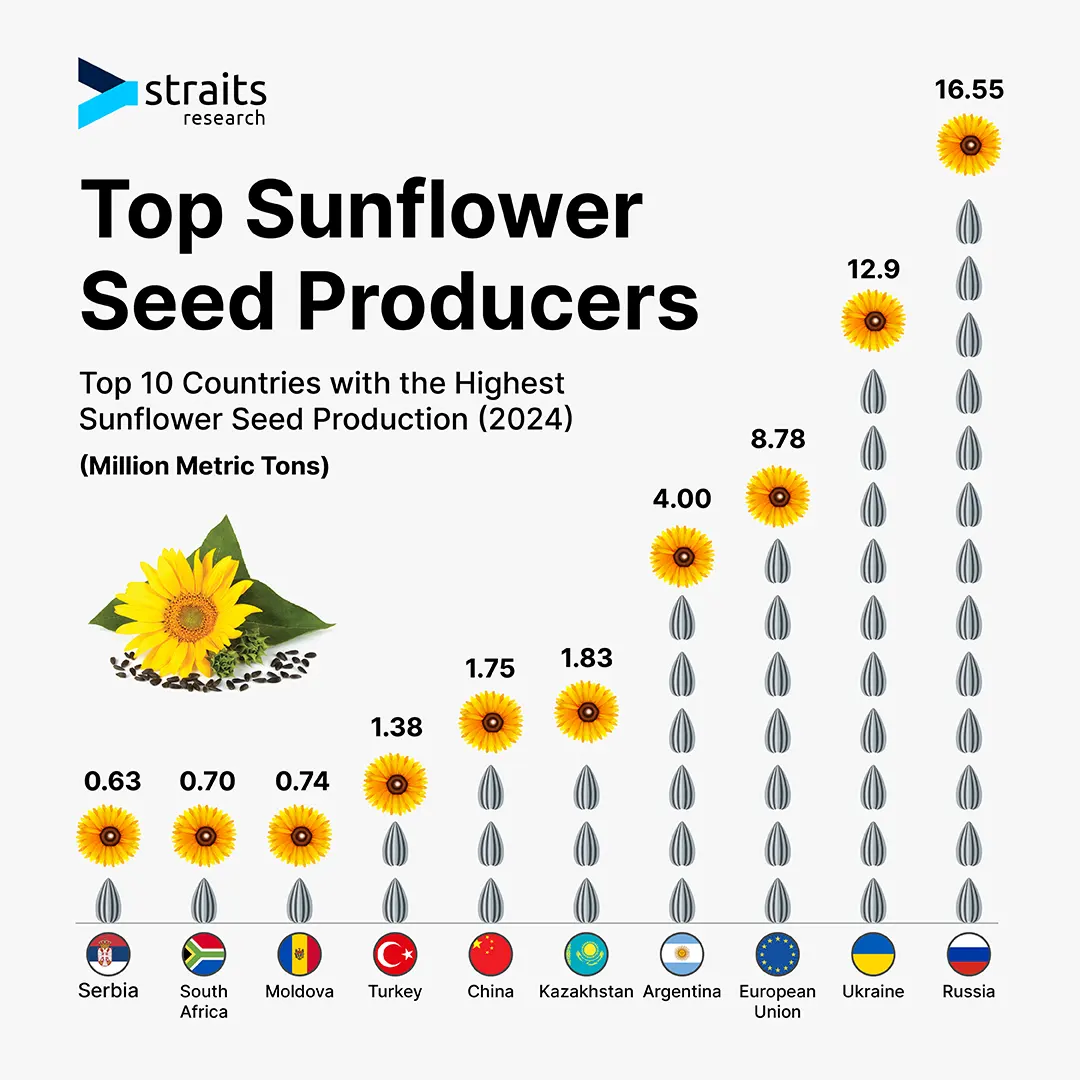Top 10 Countries Dominating Sunflower Seed Production in 2024

The adaptability and nutritional worth of sunflower seeds and their oil make them an essential part of the world's agricultural supply. These seeds find extensive use in food production, cooking, animal feed, and even industrial settings. Due to growing health consciousness, a growing desire for plant-based diets and nutritious snacks, and other factors, the market for sunflower seeds is expanding significantly. Both production and trade dynamics affect the global market, and key players impact changes in supply, demand, and prices.
Major producers and importers
The production of sunflower seeds is concentrated in a few key regions, with Russia, Ukraine, Argentina, China, Turkey, Bulgaria, and Romania being the top contributors. In 2022, Russia and Ukraine accounted for 51% of the world's total sunflower seed production. Despite geopolitical challenges, Russia remained the world's leading producer in 2024, harvesting 16.55 million metric tons. Ukraine followed closely, producing 12.9 million metric tons. The European Union collectively ranked third, contributing 8.78 million metric tons, while Argentina secured the fourth position with 4 million metric tons.
Other significant producers included Kazakhstan (1.83 million metric tons), China (1.75 million metric tons), Turkey (1.38 million metric tons), Moldova (740,000 metric tons), South Africa (700,000 metric tons), and Serbia (625,000 metric tons). Globally, sunflower farming covers approximately 26.42 million hectares, with Russia, Ukraine, Argentina, Turkey, and Romania having the largest cultivated areas.
In terms of importers, the top importers of sunflower seeds in 2024 were China, India, Turkey, Spain, and Italy, which influenced international trade patterns. India accounted for a significant 26% of world imports, followed by China (13.8%) and Turkey (13.1%). Italy and Spain both contributed significantly, accounting for 5.13% and 6.14% of world imports, respectively.
Furthermore, the international sunflower seed market is dominated by a few key suppliers. In 2023, Viterra B V was the leading exporter, commanding an 11.75% market share with exports valued at $822.11 million. It was followed closely by GITC PTE LTD (11.31%, $790.8 million) and Avere Commodities SA (9.62%, $673.02 million). Other major suppliers included COFCO Resources SA (5.48%, $383.12 million), Green Suppliers Food Trading LLC (4.91%, $343.31 million), and TOI Commodities SA (3.96%, $276.69 million). Additionally, Trade Agro Union SA, Cargill International SA, Bunge SA, and Green Suppliers Foods Trading LLC contributed between 2.56% and 3.49% of the global supply.
On the demand side, Gemini Edibles and Fats India Private Limited emerged as the largest buyer of imported sunflower seeds in 2023, accounting for 14.52% of total imports, valued at $1.02 billion. Kaleesuwari Refinery Private Limited followed with a 10.61% market share ($741.99 million), while Adani Wilmar Limited accounted for 7.64% ($534.24 million). Other significant buyers included MK Agrotech Private Limited, Ruchi Soya Industries Ltd, KTV Health Food Pvt Ltd, Gokul Agro Resources Limited, Frigorifico Allana Private Limited, Lohiya Edible Oils Pvt Ltd, Parakh Foods and Oils Limited, with import values ranging from $202.54 million to $389.08 million.
Employment and Economic Impact
One of the main sources of employment, especially in rural areas, is sunflower farming. About 250,000 households in Tanzania grow sunflowers, mostly as smallholder farmers in areas between 0.4 and 2 hectares. With its concentration in areas like Manyara, Singida, and Dodoma, the sector offers women and young people a significant source of income. Similarly, the production of hybrid sunflower seeds in Argentina employs a sizable workforce, 67% of which are external hires showing the industry's role in creating jobs in rural areas.
Furthermore, a 10% drop in sunflower seed production from the previous year is expected worldwide. Lower production in Russia and Ukraine due to geopolitical uncertainty is the main cause of this reduction. The output of sunflower oil is predicted to drop by 10% to 19.9 million metric tons as a result of this production shortage. As a result, it is projected that worldwide exports of sunflower oil will decrease by 14% in 2025. Sunflower seed costs at crushing plants have increased due to a restricted supply, and market pressures have been exacerbated by strong demand. Additionally, in some places, the cost of bird food has been rising.
The production and commerce of sunflower seeds worldwide have been seriously impacted by the ongoing conflict in Ukraine. Access to essential infrastructure and crushing capacity has been severely limited for Ukraine, a major producer. Exports of sunflower seeds have decreased, and output levels are predicted to stay below pre-war levels for some time. To reduce supply risks, big importers like China and India are responding by diversifying their sources of supply and increasingly importing from Argentina and Kazakhstan. As the industry looks to ensure supplies after 2024's reduced harvest, high-oleic sunflower prices are predicted to remain aggressive for the 2025 new crop season.
Geopolitical instability, changing trade dynamics, and changing consumer demand are all having a major impact on the global sunflower seed business. Notwithstanding the difficulties, the market for sunflower seeds continues to be an essential part of world agriculture, supporting job growth and economic development in multiple regions.




